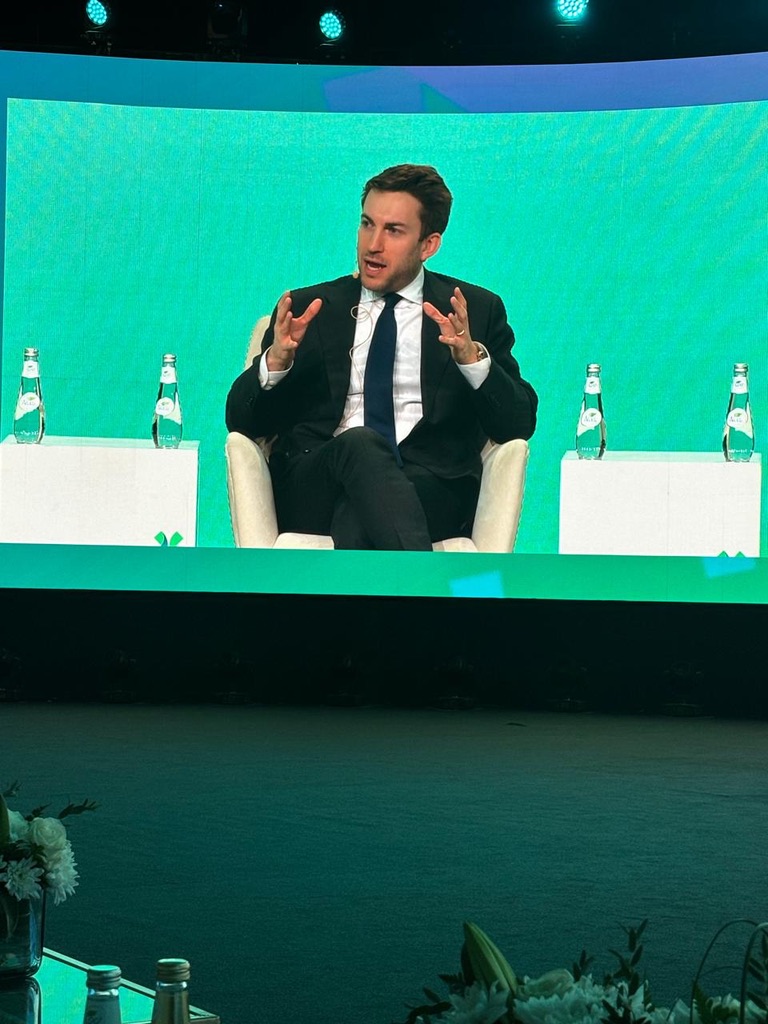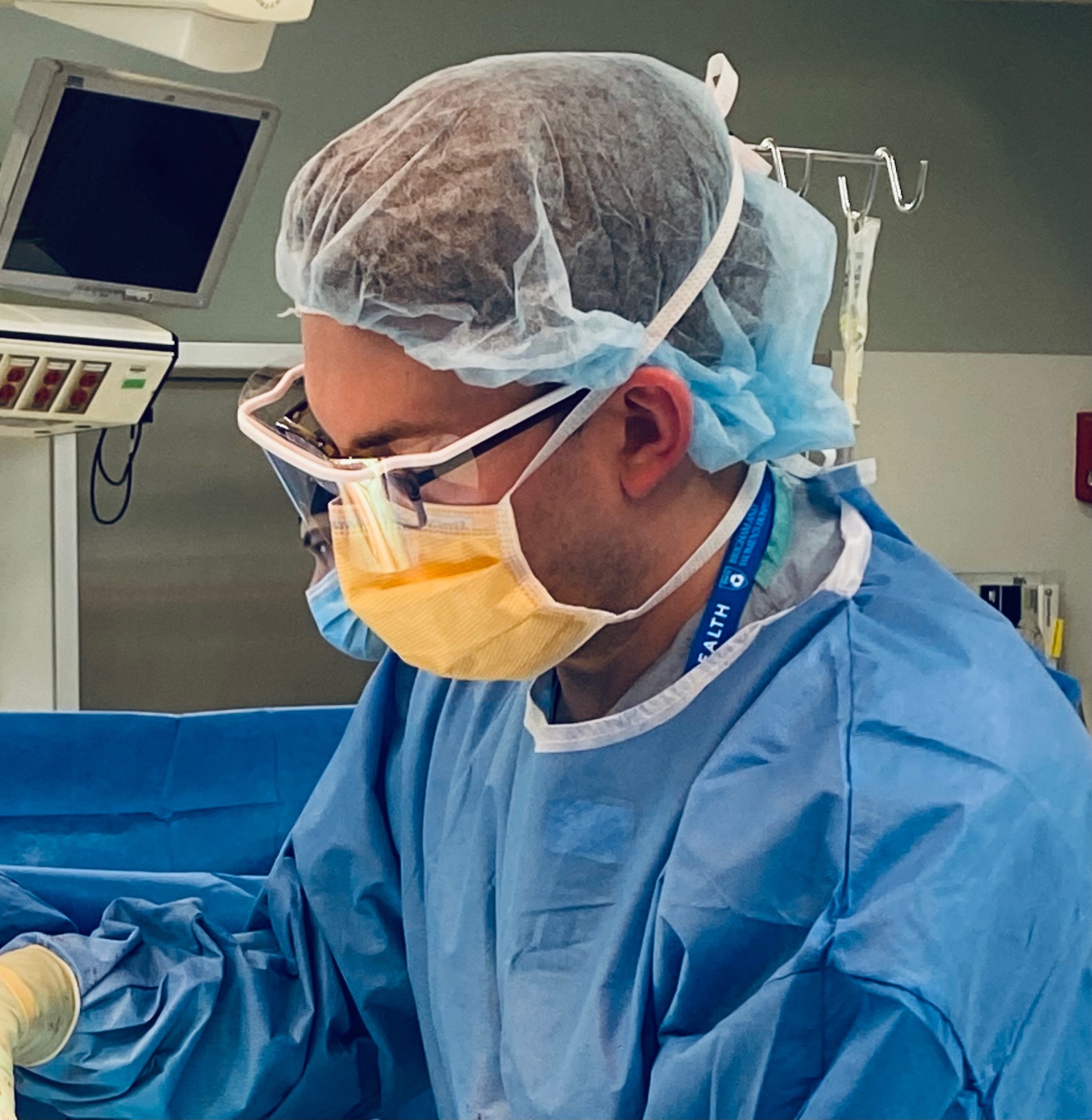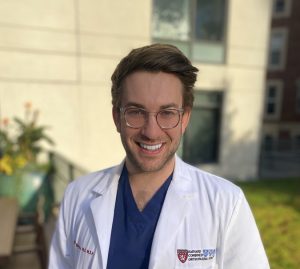Meet David N. Bernstein, MD, PhD, MBA, our graduate of the Master in Entrepreneurship and Innovation. David wears many hats – orthopedic surgeon, Senior Researcher at Harvard Business School (HBS), dedicated NGO volunteer, and foreign trade advisor for Luxembourg. His work bridges medicine, business, healthcare strategy, and policy, enabling him to drive meaningful healthcare transformation.
Recently, he was also named a David Rockefeller Fellow by The Trilateral Commission, where he will focus on healthcare transformation and its impact on global security and economic stability. We spoke with David about his interdisciplinary career, how he balances multiple responsibilities, the key lessons from his Master’s that continue to shape his work, and what motivates him to take on new challenges.
David, you came to Luxembourg on a Fulbright Scholarship. What inspired you to choose Luxembourg?
I came for a Fulbright Scholarship in 2013–2014. I was honored to be awarded this prestigious grant and grateful for the support of my country in pursuing this opportunity. Ultimately, my plan was to learn important skills and gain critical knowledge to then bring back to the U.S., which I believe I have done.
I really wanted to be in a place in the heart of Europe that would allow me to truly dive into the various cultures across the continent and see how the European Union operated and could grow and develop further. Luxembourg was a perfect fit.
I wanted to get to know people from all different backgrounds within the European Union. When I was there (and I believe it still is), about half the population was international, which made it an incredible place to gain different viewpoints and engage with people from varied backgrounds and beliefs – something I found incredibly enticing.
There was also this kind of entrepreneurial spirit in the Grand Duchy: This has been our tradition, but where can we go from here? That mindset was exciting to me. For those reasons, I thought Luxembourg would be a great place to live for a year.
Ultimately, it was the best decision I ever made. Some of my best friends are from Luxembourg, and I still stay in touch with them. Now, over a decade later, I consider Luxembourg a second home.
What was the most valuable lesson from your Master in Entrepreneurship and Innovation? Something that you use the most in your career today?
Negotiation. Every day, we make decisions – even simple ones, like something as trivial as What am I going to eat today? In a way, you’re negotiating with yourself: Do I want this or that? Then, there are major life and professional decisions. Whether it’s a business deal, deciding what house to buy, or anything else, these are all decisions that require negotiation – with yourself or with others.
In many of these situations, there’s someone else on the “other side”, so working to find a mutually agreeable outcome, knowing your limits, and understanding where your counterpart’s limits might be are all crucial aspects of effective negotiation.
The other key lesson I would highlight is the entrepreneurial spirit and focus on creativity. That mindset transcended all the courses I took because, at its core, entrepreneurship and innovation are about problem-solving, including in novel ways – seeking solutions to challenges that haven’t yet been solved or even fully explored.
To me, those were the two major lessons I learned: how to engage with people from different backgrounds to solve problems while taking appropriate calculated risks, and how to negotiate to achieve the best possible outcome in challenging situations.
If someone asks why they should study at the University of Luxembourg, what would you say?
It’s an exciting place that is still young and innovative, in a country that is beautiful and welcoming. It allows you the opportunity to meet people from an incredibly wide range of backgrounds. I think of the roughly 20 people in my class, there were 18 different nationalities. As much as it is about learning the knowledge of whatever program you are in, it’s also about engaging with people of different backgrounds – personal and professional – and beliefs. Differences of opinion – even those that you strongly disagree with or make you uncomfortable – and freedom of speech are crucial in finding the best possible solution and pushing the boundaries of what can be accomplished.
In reality, the world is extremely interconnected. Going to the University of Luxembourg highlighted that fact. So, to me, the University of Luxembourg was a fantastic opportunity and experience. I can’t speak more highly of it. I absolutely loved it, and the same goes for the country. It’s an honor to now be a foreign trade advisor and to be involved with Luxembourg. It’s a fantastic place that will challenge you both personally and professionally to grow and develop.
You balance multiple roles – orthopedic surgeon, researcher at Harvard Business School, foreign trade advisor for Luxembourg, and David Rockefeller Fellow. You work and volunteer your time in so many areas. How do you manage your time effectively?
If I find something intellectually stimulating, I’ll find the time. To me, it feels less like work and more like fun – I enjoy it. I find it engaging, and in the end, everything is interconnected, with a focus on problem solving.
Also, the challenges overlap. The challenges I see firsthand on the ground while taking care of patients are the same ones I study at Harvard Business School. The challenges I encounter from a health and healthcare security standpoint relate to the work I’m going to focus on with the David Rockefeller Fellowship at the Trilateral Commission. From a Luxembourg perspective, my foreign trade role also focuses on health and healthcare.
This interconnectedness allows me to view healthcare from various angles, seeing how others are addressing the same issues and where there may be areas for improvement. It’s both exciting and fun.
So, whether it’s working on the weekend or taking an early call like this, it doesn’t bother me. To me, this is how I stay engaged and intellectually stimulated.

What motivates you to pursue so many challenges?
My main motivation is to help solve some of the world’s toughest challenges that affect many people. I would say health and healthcare impact everyone at some point, and my goal is to face challenges in these areas “head on” to try to make a lasting positive difference – one that extends far beyond my own lifetime. That is truly my driving force.
How do your degrees in medicine, economics, business, and innovation intersect in your daily work?
They primarily intersect in two ways.
The first is understanding the language and perspectives of all these disciplines helps me problem solve and be the person who can “translate” in a group setting for those without as much of a varied background.
The second way is from a research, innovation, and entrepreneurship perspective. Being able to care for patients and then observe challenges and problems is one thing but then saying, “We’re seeing this issue, and we can try to fix it” is another. I believe having insights from these disciplines can lead to more beneficial solutions.
I suppose there is a third way as well – engaging with and discussing ideas with people from different backgrounds, ideologies, and political viewpoints. Being in different educational environments and living in Luxembourg has given me the gift of being able to engage with people from different backgrounds, which in today’s world is more important than ever. Patients will have different viewpoints, and you’ll have different views, but we must remember – at the end of the day – our mission and goals. It should be the “norm” to disagree, but respect is always key.
What does a typical day look like for you?
I’m not sure there is a typical day, as it varies a lot. Most often, it starts at the hospital. I am currently the orthopaedic trauma chief resident at Brigham and Women’s Hospital, so my day starts early. I wake up around 4 – 4:30 am and then we operate throughout the day or see patients in the emergency department or clinic. A lot of times, in between cases or at other times when there is a moment, I will respond to emails, especially those that are urgent. At the end of the day, if there’s something that is still pressing, I’ll try my best to respond to more emails, but I also really focus on reviewing surgical cases for the next day, as well as reading and studying to continue to expand my orthopaedic surgery knowledge.
Weekends are a mix of family time – which is the priority – and trying to catch up on some of the non-clinical work that I haven’t been able to get to during the week. It is always intellectually stimulating to be jumping from one thing to the other, but it can certainly be challenging. The days are long and they vary.
Last year, when I unfortunately got diagnosed with testicular cancer, I took a year off and worked at HBS because of the flexibility that a more research-focused life offers, compared to clinical life. But now I’m back clinically full-time.
Ultimately, it’s hard to say what is a typical day, but I can say it usually starts very early and ends very late.

You’ve received multiple scholarships, including the Fulbright and Rockefeller. How do you find and navigate such opportunities? What advice would you give students seeking scholarships?
Mentorship is incredibly important. I would say most, if not all, of my success to date stems from the support and guidance of mentors. Now, I’m trying to be that for others as well.
You can be both a mentee and a mentor. I would recommend finding mentors who support you, who help guide you, and who really want you to succeed and accomplish what you want. I think that’s really important and helpful, but they also need to be brutally honest with you.
Then, seek out opportunities that excite, challenge, and push you. I think a lot of times, we either don’t see or know about opportunities or we think, “Oh, we may not be able to get that, or that seems too challenging.” I would say, take the risk and go for it, because when you apply for something or push yourself harder, you never know what other opportunities might arise.
One of my mentors always said, “Say yes and seek interesting opportunities, even if they don’t seem exactly aligned with what you do. You never know what skills you’ll learn or people you’ll meet, including those who will introduce you to other people and opportunities down the line that are exactly what you are looking to do.”
How do you choose your mentors and how many mentors do you have?
I think a lot of it is personal – who you “click with” – and then a lot of it is seeking out people who you aspire to be similar to personally and professionally. It’s a mix of both personal and professional.
One of my mentors always says that the best mentors seek to put you, as the mentee, further ahead of them at each age. So, if they accomplished X at 30 years of age, they should want to try to help you accomplish that at 28 years of age, for example.
A good mentor also tells you when something is bad or wrong and doesn’t sugarcoat it, and that is one of the hardest things for both the mentor and mentee. You want someone to be honest with you. You want someone to say, “You know, this could be better, or maybe this isn’t for you, or how about this opportunity?” They shouldn’t just be putting you “down” for the sake of it, but there must be moments of honesty and transparency. Otherwise, it’s going to be a big problem.
How many mentors do you have?
I would estimate I have 5-6 mentors across different areas. So, whether it’s more on the orthopedic surgical side, focusing on how to develop into a high quality orthopedic surgeon, or more on the business or politics sides, they all play an important role in my life.
I’m fortunate that all my mentors, regardless of their background or experience, are focused on helping me grow, learn, problem-solve, and find solutions. They emphasize and stress me admitting when I don’t know something and going out to find the right person. They might come from the business world, politics, or healthcare, but they all have the same goal: how do we help you get to where you want to be and connect the dots? How do you better solve problems and engage with people?
If you could solve one challenge in healthcare, what would it be?
That’s a really tough question. While we often talk about access or technological innovation, I think the greatest challenge in healthcare is a strategic one.
What I would try to solve is better aligning how we incentivize and reimburse healthcare with the outcomes that matter most to patients. In today’s world, we focus a lot on how much is being done rather than on the health and well-being achieved – and how to optimize those outcomes for the money we spend. By refocusing on the patient-doctor relationship, promoting competition around the right incentives and outcomes, and reducing unnecessary bureaucracy, we can start to “solve” the healthcare crisis.
So, in short, what I would focus on would be rethinking how we’ve designed healthcare to be centered on the outcomes that matter most to patients. And then, how do we incentivize and reward people for delivering that care.
What trends or innovations in healthcare excite you the most?
I’m very excited about both the strategic innovations – how do we redesign and transform care delivery – and how the latest technologies, like generative AI and machine learning, can be implemented to support this strategic work. We have the technology now; it’s about figuring out how to best use it to make our lives easier as clinicians.
Where should it go? How should it be implemented? What do patients feel about it? What should the government’s role be? Should they [the government] not be involved at all? Should they [the government] be involved? All of these are challenges at play.
I’m excited to see how these latest and greatest technologies, if you will, will be implemented and how they can improve the lives of both patients and doctors, because – at present – patient care feels like it has turned into what seems to be at least half bureaucratic paperwork and half patient care, which should never be the goal. It hurts patients and causes burnout amongst healthcare professionals.
And what advice would you give students or young professionals looking to pursue an interdisciplinary career like yours?
Interdisciplinary careers are becoming more common everywhere. It’s all about problem solving and “connecting the dots”. I’d urge students and young professionals to take the risk and follow their passion.
Seek out interesting opportunities that excite you and say yes. There may not be a perfect job posting, perfect educational opportunity, or perfect scholarship for what you’re after, but you can learn something important and of value from nearly any experience that can then be applied elsewhere. It’s the critical thinking skills you are after, and from there, you can tackle challenges – big and small – or find the right people to help you do so.
